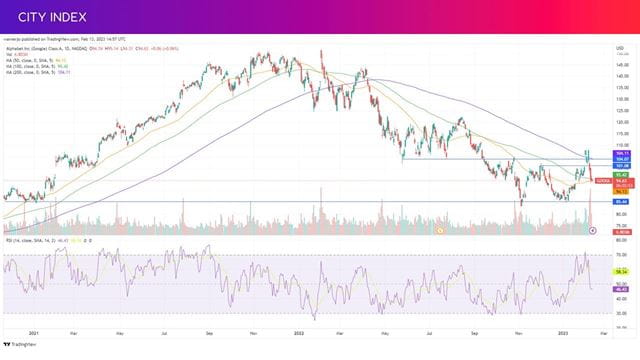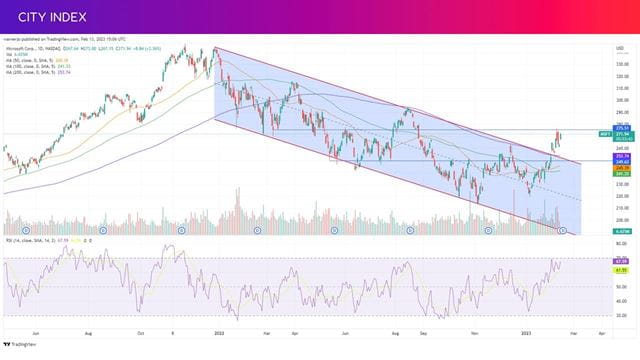
ChatGPT sparks a new race for AI supremacy
Excitement over new breakthroughs in artificial intelligence is building following the initial success of AI-driven chatbot ChatGPT, which is a digitally trained service that can answer complex questions in a conversational way developed by a company named OpenAI. Its ability to answer a wide array of questions with in-depth answers, from asking it to fix code, write a screenplay, explain scientific theories or even give life advice, has made ChatGPT the hottest new tech grabbing the imagination of the markets.
Citigroup has said it is too early to tell the true impact of ChatGPT but said it appears to be a ‘significant breakthrough’ that ‘can lend itself to many applications including search’.
Microsoft invests in OpenAI
Microsoft invested $1 billion in OpenAI back in 2019 but swiftly made a commitment to invest billions more, potentially up to $10 billion, into the company following the huge success and popularity of ChatGPT.
Microsoft is using OpenAI’s products to thrust its Bing search engine into the modern era and improve its web browser. Bing will be powered using OpenAI’s open language model, which is thought to be more advanced than the one running ChatGPT. The new Bing is now available as a preview that allows users to submit a limited number of questions and there is a waitlist to gain full access, with a view of opening it up to millions of people in the coming weeks.
‘This technology is going to reshape pretty much every software category,’ said CEO Satya Nadella.
Alphabet’s Bard has rough start
Alphabet was forced to quickly respond – much sooner than it would have liked – to show off its own AI developments in response to the initial success of ChatGPT. The fact Alphabet has seen over $100 billion wiped off its value since unveiling its own chatbot named Bard, caused by concerns that it is not up to scratch after the service provided inaccurate information in advert, shows how much sway this new era of technology has on investors.
The reason the incident has had such an impact is because Bard has only been introduced to select users before being publicly released in the coming weeks, when it will face its first test as markets weigh up how it stacks up against ChatGPT.
Just days after the gaffe, the vice president of its core Google search engine, Probhakar Raghavan, told German newspaper Welt am Sonntag that AI-driven chatbots have pitfalls. ‘This kind of artificial intelligence we’re talking about right now can sometimes lead to something we call hallucination. This then expresses itself in such a way that a machine provides a convincing but completely made-up answer’.
Microsoft declares war on Google
CEO Satya Nadella has declared war on Google’s monopoly over search and said that Microsoft can win a battle for margins considering it is building up from virtually nothing, which would be a major threat considering Google does not have the same luxury.
That is because Google handles a staggering 93% of worldwide internet searches, while Microsoft’s Bing accounts for just 3%. This shows Microsoft has everything to gain and little to lose.
‘From now on, the [gross margin] of search is going to drop forever,’ Nadella told the Financial Times last week.
Alphabet’s problem is that, at this stage of the race, it has the most to lose while its early rivals have the most to gain. Investors have become fearful that its monopoly over search could be at risk as other major players eye the market and that its technology could be leap-frogged by a competitor. Even if it can maintain its leading position, more intense competition from the likes of Microsoft could weaken Alphabet’s margins.
Microsoft’s Nadella has said he is willing to accept any demonestisation in search if it allows it to gain ground on Alphabet. ‘There is such margin in search, which for us is incremental. For Google, it’s not, they have to defend it all,’ he said.
Still, the onus is on Microsoft to shake things up. Alphabet is the dominant leader and most people have never used another search engine. Changing people’s habits is tricky and Alphabet is the one with the expertise and, more importantly, the data needed to drive AI forward. It may have had a rough start, but investors should remember that is still very early days for what is still a nascent industry and that Alphabet has been investing in AI for at least a decade.
Plus, this is not a two-horse race considering a slew of other companies are working on their own chatbots, including but not limited to Chinese tech outfits Alibaba and Baidu. That leaves scope for another company to take the lead and means the world will not be short on choice over the coming years. That should help the technology progress quickly as all of them try to get ahead of the pack.
How to invest in AI stocks
Investors are eagerly on the hunt for new opportunities in artificial intelligence, and Alphabet and Microsoft are not the only players hoping to carve out a name for themselves in this space. Other major tech giants like IBM and Amazon, as well as a number of smaller pure-plays like C3.ai, are working on AI. You can read more in The Best Artificial Intelligence Stocks to Invest In.
There are also other companies that will prove crucial in powering the future of AI, such as semiconductor and networking firms that provide the equipment needed to fuel the power-hungry industry. For example, Bloomberg data released this month suggests the AI networking market is forecast to be a $8.5 billion market by 2027 compared to just $1.6 billion in 2022, and that could see companies like NVIDIA, Cisco, Arista and Juniper benefit.
Where next for Alphabet stock?
Alphabet shares have dropped 12% since hitting five-month highs earlier this month. The stock is on course to lose ground for a fourth consecutive session today but the 50-day moving average has held as a firm floor for the past three, suggesting this is providing a firm level of support. Any slip below here brings sub-$86 into play.
A return above $101 is the immediate upside target before targeting $104, in-line with the lows we saw last May and July as well as the current 200-day moving average. Over the longer-term, brokers see as much as 32% potential upside from current levels with the average target price sat at $125.44, which was last seen in April 2022.

Where next for Microsoft stock?
Microsoft shares have broken out of the downtrend that had plagued the stock for over a year, having risen almost 23% since last bottoming-out in early 2023, and has recaptured the 200-day moving average for the first time in 10 months.
We have seen evidence that $275 is providing some resistance and the RSI is on the cusp of testing overbought territory, which may make it more difficult to keep up the recent momentum. A move toward $293, the ceiling seen in April and again in August, is on the cards if it can break above here.
The stock may fall back toward the 200-day moving average, currently at $253.75, if it does lose momentum. A move below $250 would then be on the radar before the other moving averages come back into play.

How to trade Alphabet stock and Microsoft stock
You can trade both stock with City Index in just four easy steps:
- Open a City Index account, or log-in if you’re already a customer.
- Search for ‘Alphabet’ or ‘Microsoft’ in our award-winning platform
- Choose your position and size, and your stop and limit levels
- Place the trade
Or you can practice trading risk-free by signing up for our Demo Trading Account.





